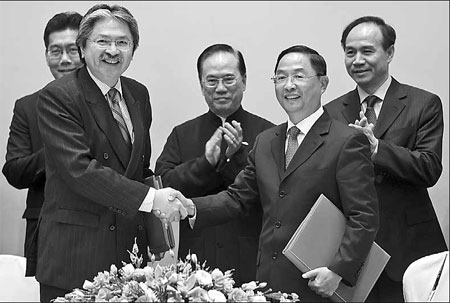Prescription for healthy growth
Updated: 2012-07-01 08:06
By Oswald Chen in Hong Kong(China Daily)
|
|||||||
|
Outgoing Hong Kong Chief Executive Donald Tsang (center) witnesses the signing of Supplement VIII to the Mainland and Hong Kong Closer Economic Partnership Arrangement by Financial Secretary John C. Tsang (second left) and Vice-Minister of Commerce Jiang Yaoping at the Conference Hall, Central Government Offices, on Dec 13, 2011. Edmond Tang / China Daily |
Close mainland ties to give a boost to service sector exports
Editor's note: CEPA, the first-ever free trade agreement signed in 2003 between Hong Kong and the mainland, helps bring the city's businesses closer to the huge mainland market while Hong Kong serves as a "springboard" for mainland enterprises to reach out to the global market.
The business and professional services industry has played a vital role in Hong Kong's economy and also in the city's transformation as a leading global business hub. With the Hong Kong economy getting increasingly integrated with the mainland in the last 15 years, the professional services sector in the city is now ready to capitalize on the open market policies to gain a strong foothold in the mainland market.
Much of these gains have happened after China joined the World Trade Organization in 2001. By integrating closely with the mainland economy, Hong Kong has been able to take advantage of the gains from China's WTO membership. The signing of the Closer Economic Partnership Arrangement between Hong Kong and the mainland in 2003 was another major economic milestone.
CEPA, a free trade pact, gave Hong Kong enterprises the first-mover advantage when China gradually started to open up its domestic market for foreign businesses as part of its WTO commitments. The central government also granted more preferential policies for Hong Kong enterprises under the CEPA than to other WTO members.
The first-mover advantages have helped many business and professional services firms - including real estate agents such as Centaline Property and 21 Holdings - to lay down strong foundations on the mainland. The CEPA allows Hong Kong real estate agents to operate wholly owned branches on the mainland without any operational restrictions.
Centaline Property, a leading Hong Kong realtor, has been one of the major beneficiaries of the CEPA. The company established its mainland foothold in 1992, 11 years before the CEPA came into existence. But its pace of expansion up to 2003 was slow and it had just 200 branches and 2,000 real estate agents on the mainland.
However, with China's entry into the WTO and the subsequent signing of the CEPA, Centaline has expanded its mainland branch network to 1,500 scattered across 30 provinces and employs nearly 30,000 real estate agents.
The group is optimistic about its future expansion on the mainland. "More participation in global economic organizations such as the WTO will spur trade and investment flows between China and the world. In due course, that eventually will enhance housing demand for mainland properties," says Sherman Lai, chairman of Centaline.
Going forward, Lai expects Centaline's mainland business to contribute more to the group's turnover. "In 2010, the mainland property transaction business contributed HK$4.1 billion ($529 million) to the group's total turnover of HK$8.7 billion. I expect the share of mainland business in the group's total turnover will rise in the future," he says.
Yale Yeung, director of Kingstar Strategic, a wholly owned subsidiary of 21 Holdings, which focuses on the real estate transaction business on the mainland, also has similar views.
"I think the central government has already opened a good platform for Hong Kong property agencies by allowing them to open their wholly owned subsidiaries on the mainland through CEPA. It also permits Hong Kong property agent license owners to get a China property agent license after passing an examination. All these measures will allow Hong Kong real estate agents to join the mainland property agent business more easily," Yeung says.
The recent mutual recognition of professional qualifications for the real estate industry will provide a favorable backdrop for more business interactions between local and mainland real estate agents, he adds.
The mutual recognition of professional qualifications for the real estate industry is a natural extension of the CEPA. The Estate Agents Authority of Hong Kong and the China Institute of Real Estate Appraisers and Agents on the mainland agreed in November 2010 that the professional qualifications of both the mainland and local real estate agents will be mutually recognized. This has helped create a scenario wherein the business potential for real estate practitioners will be vastly expanded.
Looking ahead, Yeung says that Kingstar Strategic will focus on developing the secondary home market in the second- or third-tier cities on the mainland as this new market segment is predicted to blossom in the future.
"With the advent of urbanization, more residential buildings will be built. Over time, this helps herald the rise of a robust secondary home market on the mainland," Yeung says.
oswald@chinadailyhk.com
(China Daily 07/01/2012 page8)
